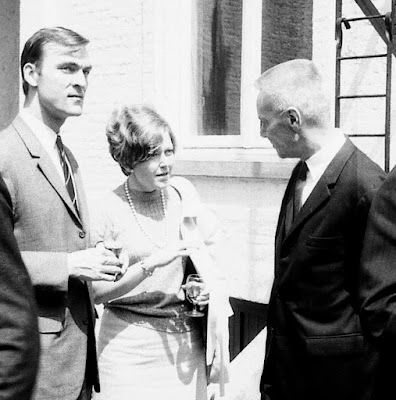Reflections on my academic year at the College of Europe in Brugge (Bruges) Belgium in 1967/68
JAN TINBERGEN
This is Jan Tinbergen in the garden of the student residence in Sint Jakobstraat in 1968. He was awarded the Nobel Prize in Economics the following year. I don't think I spoke to the man but I was in his presence and he in mine, and that's enough. He gave a course module on a subject dear to his heart and very relevant to decision making at the EU, national and local level. The idea was to decentralise decision making to its lowest feasible level in the hierarchy. I have reproduced his exam paper in another post.
He is relevant to my story for two reasons in particular.
The first is econometrics. He is credited with being one of the founding fathers of econometrics and this was a time when economies were being modeled all over the place, including first tentative steps in Ireland. The whole econometric scene ranged from complex mathematical modelling of the whole economy to sometimes crude input-output models of limited sectors.
I had attended econometric lectures from Bill O'Riordan in UCD and I think he lost me after the first five minutes. Nevertheless, on my departure for Brugge, after a whole half-day in the Department of Finance, I was given a secret mission by my boss, Maurice Doyle. The Department was feeling its way into Input-Output with Eamonn Henry from the Central Statistics Office and would be shortly embarking on a major econometric modelling exercise of the whole economy. This would be undertaken by some of my colleagues-to-be, under the direction of Maurice Doyle himself and with the assistance of Professor Abdul Kahn (OECD & Pittsburgh).
My mission, whether I chose to accept it or not, was to find out what the EEC Commission was doing in the input-output area and report back directly and exclusively to Maurice Doyle. I did inquire at the Commission in the course of a visit there on other matters. As a result I was able to bring back a bulky folder showing the most up to date version of the Commission's work on this subject. Shortly after I "rejoined" the Department, Michael Viney did his report on progress in the modelling exercise. It was headlined: Planners get Computer "Oracle". I kid you not.
The second reason is regional physical planning and devolution. Notice I didn't say decentralisation, though I'm sure that also came within Tinbergen's purvey. However the main thing I remember about him was the idea of a spatial hierarchy of decision making. Decisions were to be devolved to the lowest feasible level. This did not rule out centralised planning but it was only part of the process.
At a much later stage in my career I was called in by the Secretary General of the Department and told to summon the existing half-dozen or so Regional Development Organisations (RDOs) and tell them in my best Trumpian tones that they were all FIRED. Didn't happen.
Then, later still, I was, reluctantly, involved in Charlie McCreevy's mad cap scheme to decentralise half the public sector here, there and everywhere. Talk about variety.
I'll wind this post up with Hartmut and Heidi putting Tinbergenn through his paces (below)
Subscribe to:
Post Comments (Atom)


No comments:
Post a Comment